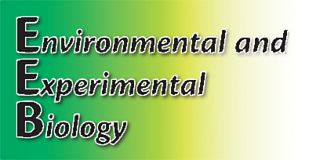
On-line: ISSN 2255–9582

| Faculty of Biology, University of Latvia | ||||||

|
Hard copy: ISSN 1691–8088
On-line: ISSN 2255–9582 Environ Exp Biol (2018) 16: 177–183
|
|||||

|
About the Journal | Retractions | Open Access | Author Guidlines | Current Issue | Archive |
|
Environmental and Experimental Biology |
Environ Exp Biol (2018) 16: 177–183 |
Biological fertilizers are being developed on the basis of plant growth promoting microorganisms isolated from the plant rhizosphere, phyllosphere and endosphere. The aim of this study was to determine influence of a consortium of plant endophytes on rhizosphere microbiota in a greenhouse vegetation experiment with barley. Fifty-five bacterial and fungal strains were isolated from leaves, stems and roots of oilseed rape and barley. Twentty five of them did not inhibit seed germination. Most of them belonged to the genera Serratia, Enterobacter, Brevibacillus and Pseudomonas. Individual isolates demonstrated phosphate solubilization ability, nitrification potential and urease activity. Impact of the multi-strain microbial consortium on cultivable microbiota of rhizosphere was estimated in a 19-day greenhouse experiment with barley. Concentration of phosphate solubilizing and cellulolytic microorganisms in the rhizosphere was below the detection limit. The consortium increased the total number of bacterial colony-forming units but did not affect the number of actinobacterial and fungal colony-forming units. Interactions between species in the multi-strain consortium and between introduced and indigenous populations are discussed.